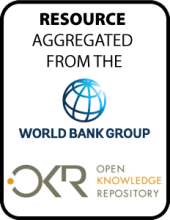Land Library Search
Through our robust search engine, you can search for any item of the over 73,000 highly curated resources in the Land Library.
If you would like to find an overview of what is possible, feel free to peruse the Search Guide.
/ library resources
Showing items 1 through 9 of 122.Rwanda's completion, in 2012/13, of
a land tenure regularization program covering the entire
country allows the use of administrative data to describe
initial performance and combine the data with household
The Philippine Economic Update (PEU)
provides an update on key economic and social developments,
as well as policies over the past six months. It also
presents findings from recent World Bank studies on the
This paper looks at the evidence on the
magnitude and impacts of forest illegal acts, examines the
vulnerabilities of the forest sector, and proposes a
strategy for combating forest crime. Forest crime
(covering the activities of IBRD/IDA), the Operations Evaluation Group (covering IFC), and
the Operations Evaluation Unit (covering MIGA). The purpose of the evaluation is to assess
the effectiveness of the World Bank Group (WBG) in helping its member countries improve
Policies that enable rural communities
to participate in expanding economic opportunities can be
central to inclusive growth in Myanmar. Rural communities
are home to the majority of Myanmar’s population, the
Doing Business in Egypt 2008 covers
three topics at the sub national level: starting a business,
dealing with licenses and registering property. These
indicators have been selected because they cover areas of
This paper estimates slum residents
willingness to pay for formalized land tenure in Pune,
India. In so doing, it offers evidence that the legal
assurance of slum residents occupancy of their lands could
Since the industrial revolution, the
economic development of Western Europe and North America was
characterized by continuous urbanization accompanied by a
gradual phasing-in of urban land property rights over time.
Poland’s economic growth over the last
25 years has been spectacular. In that period, Poland has
more than doubled its income per capita and became a
European growth champion. It was the only EU country to

